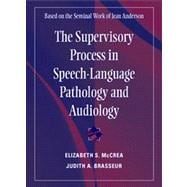
The Supervisory Process in Speech-Language Pathology and Audiology
by McCrea, Elizabeth S.; Brasseur, Judith A.Rent Textbook
New Textbook
We're Sorry
Sold Out
Used Textbook
We're Sorry
Sold Out
eTextbook
We're Sorry
Not Available
How Marketplace Works:
- This item is offered by an independent seller and not shipped from our warehouse
- Item details like edition and cover design may differ from our description; see seller's comments before ordering.
- Sellers much confirm and ship within two business days; otherwise, the order will be cancelled and refunded.
- Marketplace purchases cannot be returned to eCampus.com. Contact the seller directly for inquiries; if no response within two days, contact customer service.
- Additional shipping costs apply to Marketplace purchases. Review shipping costs at checkout.
Summary
Table of Contents
Forward by Jean L. Anderson, Ed.D.
Preface.
Acknowledgements.
1. Introduction.
Describing Supervision and Supervisors.
Settings for Supervision.
Complexities of the Supervisory Process.
Characteristics of Supervisors.
Purposes of Supervision.
A Definition for Speech-Language Pathology or Audiology.
2. Anderson's Continuum Model of Supervision.
Development of Supervisory Behaviors.
Supervisory Approaches in Speech-Language Pathology and Audiology.
The Continuum of Supervision in Speech-Language Pathology and Audiology.
Appendix 2: Samples of a Direct, Direct/Indirect and Indirect Supervisory Conference.
3. Components of the Supervisory Process.
Component I: Understanding the Supervisory Process.
Component II: Planning.
Component III: Observing.
Component IV: Analyzing.
Component V: Integrating.
Practical Research in Supervision.
Appendix 3: A ASHA Position Statement on Clinical Supervision.
4. Understanding the Supervisory Process.
Purpose of the Component.
Treatment of the Supervisory Process in Conferences.
Understanding Roles in the Supervisory Process.
Expectations for Supervision.
Anxiety in the Supervisory Process.
Implications for Participants in the Supervisory Process.
Preparing for Supervision.
Teaching Supervisees about the Supervisory Process.
Appendix 4-A: Larson's Expectations Scale.
Appendix 4-B: Larson's Needs Scale.
Appendix 4-C: Tihen's Expectations Scale.
Appendix 4-D: Broyle's et al Supervision Surveys.
Appendix 4-E: Powell's Attitudes Toward Clinical Supervision Scale.
Appendix 4-F: Supervisory Conference Rating Scale.
Appendix 4-G: Casey's Supervisory Skills Self-Assessment.
5. Planning the Supervisory Process.
Assessment of Supervisees.
Implementing the Planning Component.
Planning the Supervisory Process.
Realities of Planning.
Appendix 5-A: Wisconsin Procedure for Appraisal of Clinical.
Competence (W-PACC).
Appendix 5-B: Indiana University Evaluation of Practicum.
Appendix 5-C: Bartlett's Supervisory Action Plan.
6. Observing the Supervisory Process.
Purposes of Observation.
Characteristics of Observation.
Importance of Observation.
Planning the Observation.
Strategies for Observation.
Development of Observational Techniques.
Analysis Systems in Speech-Language Pathology and Audiology.
Where Have All the Systems Gone?
Appendix 6-A: Kansas Inventory of Self-Supervision (KISS).
Appendix 6-B: Boone and Prescott Interaction Analysis System.
Appendix 6-C: Analysis of Behavior of Clinicians (ABC).
Interaction Analysis System.
7. Analyzing the Supervisory Process.
Scientific Aspects of Analysis.
Importance of Analysis.
Purposes of Analysis in Supervision.
Methods of Analysis.
Determining the Content of the Supervisory Conference.
Evaluation.
Appendix 7-A: Formative Evaluation Tool.
8. Integrating the Components.
Scheduled Conferences.
Communication in the Conference.
Skills for Facilitating Communication in the Conference.
Interpersonal Aspects of the Conference.
Planning For the Conference.
Feedback.
Conferences.
What's a Supervisor To Do?
9. Preparation for the Supervisory Process.
Preparation in Speech—Language Pathology and Audiology.
Models for Preparation in the Supervisory Process.
Implications of Adult Learning Styles.
Need For Research on Preparation of Supervisors.
Outcomes of the Supervisory Process.
Use of Interaction Analysis Systems.
Appendix 9-A: Underwood System for Analyzing Supervisor-Clinician Behavior.
Appendix 9-B: Culatta and Seltzer Interaction Analysis System.
Appendix 9-C: McCrea's Adapted Scales for Assessment of Interpersonal Functioning.
Appendix 9-D: Smith's Adapted MOSAICS.
10. Accountability.
Accountability Systems within the Professions.
Accountability Systems External to the Professions.
Supervisor Accountability.
Leadership-Administration-Management.
11. Supervision Across Settings.
Supervision in the Service Delivery Setting.
Supervision in Off-Campus Practicum.
Supervision of the Clinical Fellowship Year.
12. The Supervision of Speech-Language Pathology Assistants.
Background.
Scope of Responsibility.
Utilization and Training of Speech-Language Pathology Assistants.
Supervision of Speech-Language Pathology Assistants.
Knowledge and Skill for Supervisors of Speech-Language Assistants.
Preparation for the Supervisory Process.
Accountability.
Appendix 12-A: ASHA Knowledge and Skills Document.
Appendix 12-B: ASHA's Practical Tools and Forms.
For Supervising Speech-Language Pathology Assistants.
Case Problems.
References.
Subject Index.
Author Index.
An electronic version of this book is available through VitalSource.
This book is viewable on PC, Mac, iPhone, iPad, iPod Touch, and most smartphones.
By purchasing, you will be able to view this book online, as well as download it, for the chosen number of days.
Digital License
You are licensing a digital product for a set duration. Durations are set forth in the product description, with "Lifetime" typically meaning five (5) years of online access and permanent download to a supported device. All licenses are non-transferable.
More details can be found here.
A downloadable version of this book is available through the eCampus Reader or compatible Adobe readers.
Applications are available on iOS, Android, PC, Mac, and Windows Mobile platforms.
Please view the compatibility matrix prior to purchase.
